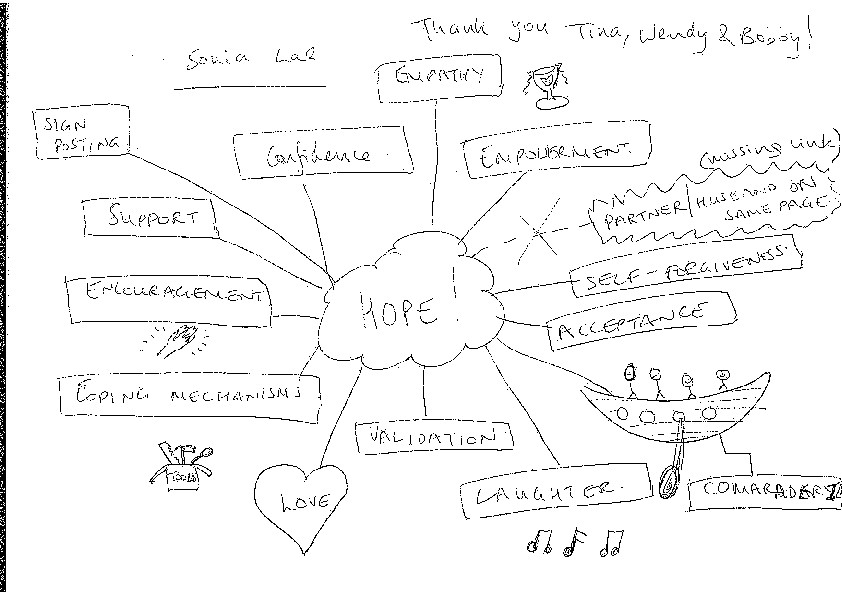Guest post by Professor Andy Turner, Centre for Advances in Behavioural Science
“The HOPE course has helped me become a better person. The team leaders were fantastic and I always looked forward to coming and being positive.”
“It gave us the chance to sing from the same hymn sheet, so we are not alone. It was nice being around people going through the same issues as me.”
“The HOPE Programme has given me hope. Thank you all.”
These are just some of the moving messages of thanks we have received from parents who have attended our HOPE courses. They are always lovely to read, but they mean more to us than just a pat on a back and a congratulations for running a good course.
These heartfelt messages show the difference these courses have made to the lives of parents of children with autism spectrum disorders (ASD). They highlight how the programme is tackling some of the issues that can devastate the lives of families with a child with ASD. The story behind the creation of the course, how it was developed and why, is an important one.
Autism spectrum disorder refers to a range of lifelong neurodevelopmental conditions. These are autism, Asperger syndrome and a subtype of autism known as pervasive developmental disorder – not otherwise specified (PDD-NOS).
These conditions affect one per cent of children, but according to NICE the prevalence is increasing. They can cause those with the condition to have social interaction and communication difficulties, throughout their lives. But because of the lifelong nature of ASD, there are severe implications for parents as well. Parents of children with ASD have elevated levels of stress and psychological distress, compared to parents of typically developing children and parents of children with other neuro-disabilities.
One parent’s ‘mind map’ of the benefits of the Hope course.
While many parents cope well with these demands, some experience clinically significant levels of anxiety and depression. Given the reciprocal relationship between parental and child distress, it is important to the distress these issues can cause for the parents and wider family. But there is a currently a major gap in service provision to address parental and carer wellbeing. Research is vital to develop interventions to improve parental and carer mental health, child and family wellbeing and to potentially reduce the societal costs of ASD that impact wider public and health care services.
This is where Coventry University and its spin out company Hope For The Community CiC comes in. We developed a face-to-face, six week, positive psychology based self-management intervention to improve the mental health of parents of children with neurodevelopmental disorders, including autism.
It’s called the HOPE Programme. And so far more than 300 parents in Coventry and Warwickshire have attended its courses, delivered through the Heart of England Carers Trust.
The work has now spread to another part of the country. Torbay and Devon NHS Foundation Trust and North and East Devon Partnership NHS Trust have recently started to deliver the HOPE Programme too. The HOPE programme is often delivered by parents of children with autism. It’s tailored to help them develop tools in areas such as coping with stress, anger (in themselves and the child), and behavioural issues; which is a very large part of living with autism.
It uses evidence-based activities, such as goal setting, action planning, mindfulness and gratitude diaries, to create an upward spiral of positive emotions leading to improved resilience. We can tell from the feedback from participants that these activities are helping them. Mums and dads are going away after taking part in the course and thinking about how they can use these activities to make a positive difference in their daily lives. One parent wrote:
“We learned how to use breathing techniques to help when feeling stressed. The gratitude activity was a good thing as you can forget to say thank you to people.”
Our research about the HOPE programme shows that parents who attend the courses report large improvements in depression, anxiety, positive mental wellbeing, hope and gratitude.
As Tina Malin, one of the parents’ facilitators of the programme, explains:
“The primary thing they take away from HOPE is the understanding that they are not alone, that the feelings they experience are normal for a parent or carer in these situations.”
It brings us back to the comments at the start of the blog. Parents, in their own words, saying how the programme has helped them. How it has made them realise they are not alone and how they are not the only people dealing with these issues. How it has given them practical ways to help reduce stress and to be more positive.
These words are one of the ways we know that this programme is making a difference. And the most important phrase for us to hear? It’s this one:
“The HOPE Programme has given me hope.”





Comments are disabled